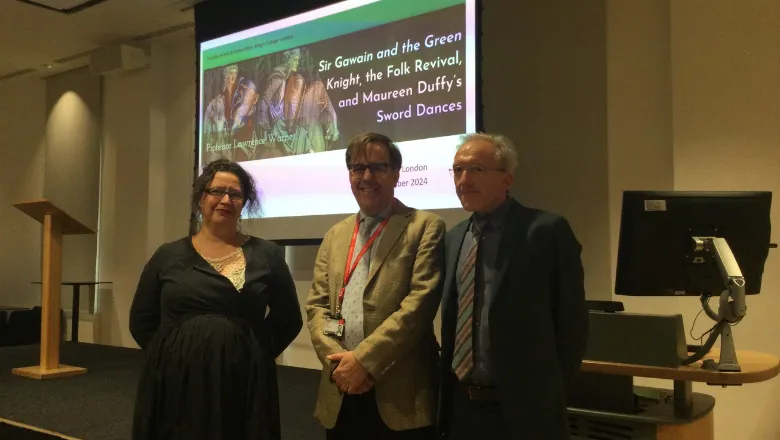Professor Lawrence Warner, Professor of Medieval English in the Department of English, investigated the links between folk dancing and a famous medieval poem for the Arts & Humanities Inaugural Lecture series.

In the lecture, Professor Warner tracked the history of interpretations of Sir Gawain and the Green Knight, a romance verse from the English Middle Ages, and its relevance for modern audiences. He shared his analysis of the verse, highlighting its journey through time to the present day, but also drew on his personal journey of discovering the poem through his friendship with King's alumna Maureen Duffy.
My entry into all of this was meeting Maureen Duffy at a King's event, interviewing her about her love of another medieval poem, Piers Plowman, and hearing about her love of Sir Gawain and how she saw it as a retelling of this vegetation myth connected to sword dancing.
Professor Lawrence Warner, Professor of Medieval English
Weaving together connections between Victorian chapters on Sir Gawain and the Green Knight, interest in folk dancing, The Green Knight by South African playwright H.W. D. "Cake" Manson, and connections with J. M. Coetzee, Professor Warner led the audience to Duffy's 1967 novel The Paradox Players. This work was inspired by the nature passages of Sir Gawain and the Green Knight, with the notion of the Green Knight as a vegetation god.
Sir Gawain and the Green Knight is the most wonderful medieval English poem. Its translations (such as by Simon Armitage), children's versions (like the one by King's alumni Michael Morpurgo), and reimaginings in opera and film (Birtwistle/Harsent; David Lowery) are widely celebrated - but it shows up also where no one has looked. King's alumna Maureen Duffy's renewal of this poem about rebirth brings it alive in ways we are just beginning to realise.
Professor Lawrence Warner, Professor of Medieval English
A recording of the event will be uploaded here once available.







